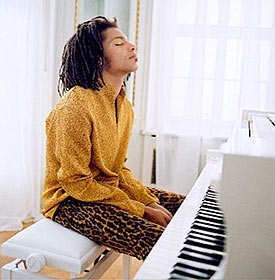
Let’s get a couple things straight: Terence Trent Howard, a.k.a Terence Trent D’Arby, a.k.a. his latest name–which came to him in a dream–Sananda Francesco Maitreya, is a certifiable nut. He also doesn’t seem to have someone in his entourage who can reel in his nutty musical impulses, which leads to peculiar interludes, asides, giggling, and soliloquies in his recordings. He likes making weird concept albums, rock-opera things that sound like what might happen if Wilson Pickett were fronting Styx.
Yet his voice is beautiful, powerful, and rough. His grasp of soul singing is extraordinary; he can effortlessly flit from gospel to jazz to hard funk to pop to Memphis-style soul shouting, and even pull off late-’60s psychedelic soul, which was pretty weird to begin with but yet he makes it sound cool. He’s kind of like Prince, except more flawed in a Sun Ra kind of loony way (both D’Arby and Ra had issues with U.S. Army service, so they have that in common).

But anyone who rips Sananda Terence Trent Howard Francesco D’Arby Maitreya for being unoriginal because he comes too close to Prince at times also must contend with the counter-argument that both based their acts a little too closely on James Brown’s. In my world, that’s a virtue. As for the concept albums, well, at least he’s got a composing, arranging, and production game plan and sticks to it, and isn’t dashing off a bunch of featherweight singles in hopes that some remix genius will turn them into radio hits.
With that out of the way, we move to 1989: A couple years after his debut album Introducing the Hardline According to Terence Trent D’Arby went platinum in its first three days of release amid some kind of hype tidal wave reminiscent of KISS albums in the late 1970s (it’s sold 12 million and counting), he followed it up with an insane left-turn of a record, Neither Fish Nor Flesh: A Soundtrack of Love, Faith, Hope & Destruction. It sold a couple million copies before the confused music-buying public checked out of the cult of D’Arby in droves.

Truth be told, D’Arby’s artistic vision of love, faith, hope, and destruction was a bit too much to process back then. Looking back over the decades, however, it contained some pretty hot stuff, some of which stands up to time a lot better than the crap the public actually did buy in larger quantities back in the day, such as Milli Vanilli. Exhibit 1: “This Side of Love,” one of the best cuts on any of his records.
He approaches Prince’s funky-preachy-James-Brown-heh! best in “You Will Pay Tomorrow,” and does a fantastic Curtis Mayfield thing in “I’ll Be Alright”. How can you not like this stuff?
And you can’t forget the song “Billy Don’t Fall”–and its video–which probably alienated a lot of strait-laced, uptight folks. God bless him for teaching tolerance for our gay friends and fighting the good fight. D’Arby might have lost some record sales with that one, but the more I learn about the ways of the world over time, the more he earns my respect for having done it.
[kml_flashembed movie="http://www.youtube.com/v/o8Ro83fCCTY" width="425" height="344" allowfullscreen="true" fvars="fs=1" /]
If you missed Fish/Flesh, it’s understandable. A lot of people did, despite Rolling Stone‘s spot-on perfect evaluation of this eccentric little record, which is probably the first and last time that ever happened in that mag. Four stars, yet cataloging its faults well.
The good thing? This record is available everywhere fine used CDs are sold in stores and online. I had a choice of a dozen at my favorite disc-swap site, so I didn’t pay a dime for it myself. Even at this late date he’s worth checking out; the guy’s a great soul singer, period.

![Reblog this post [with Zemanta]](http://img.zemanta.com/reblog_e.png?x-id=2816bc2a-7b24-4d23-9883-073b2dadb9e2)



Comments